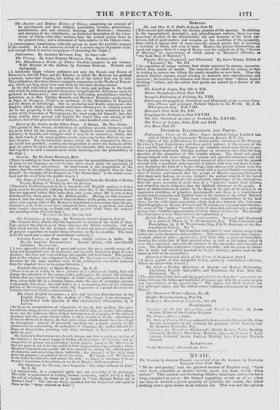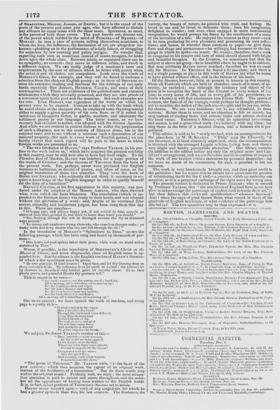M [SI C.
The Seasons, by JOSEPH 'HAYDN, translated from the German by EDWARD TAI(LOli, Gres. Prof. Mute.
" Music and poetry," said the greatest master of English song. "have ever been regarded as sisters—lovely apart, yet more lovely when united." This natural and becoming alliance musicians and poets have long conspired to sever ; the former regarding words as of no other use than to furnish a given quantity of syllables for sound, the latter looking down upon music as an inferior art. This was not the opinion of SHAKSPERE, MILTON, JONSON, or DANTE ; but it is the creed of the poets of the present and some past ages, who have affected to disdain any alliance on equal terms with the sister muse. Ignorance, as usual, is the parent of both these errors. The poet knows not, dreams not, of the power which resided in the mind of PURCELL—of HANDEL—Of MOZART : he sees a race of persons calling themselves musicians, to 'whom the love, the influence, the fascination of art, are altogether un- known—plodding on in the performance of a daily labour, or struggling for eminence by low cunning and paltry intrigue. ico wonder that, regarding such men as musicians instead of music-mongers, he looks down upon the whole class. Between minds so separated there can be no sympathy, no concert they move in different orbits, and dwell in a different region. We can easily judge of a musician's taste and acquirements by the sort of alliance which he forms with poetry when the union is one of choice, not compulsion. Look over the words of HORSLEY'S Glees, for example, and they will be found to embrace a selection from the choicest English poetry ; as in those of STEVENS we trace his extensive reading and fondness for the writings of our early bards. especially Blis JONSON, lIsainicg, CAREW, and some of their contemporaries. These are evidences of the polished taste and classical attainments which they severally possessed, and they are also proofs of a congenial spirit in the poet and the musician. But such examples are too rare. Even HANDEL was regardless of the words on which his powers were to be exerted. Content to take up with the trash which he could obtain at the cheapest rate, lie employed some rhyming menial either to supply a given quantity of his own lines, or if it suited his indolence or incapacity better, to garble, mutilate, and adulterate the aublimest poetry in our language. The latter course, as we have recently had occasion to notice, was adopted with the Samson Agonistes, And while we are content in patient dulness to suffer the perpetuation of such a disgrace, not to the memory of Mii,Tosr alone, but to the national taste, and to see without a murmur such a desecration of our national property, (for such is every work of English genius,) we can hardly expect that much regard will be paid to the dress in which foreign works are presented to us. "The two Oratorios of HAYDN," says Professor TAYLOR, in his pre- face to the work before us," which have acquired the greatest celebrity in this country, may be said here also to have had their origin. To the Paradise Lost of MILTON, HAYDN was indebted for a large portion of the words of Creation: and the Seasons of THOMSON form the basis of the present work. Yet, perhaps, never were produced two English versions so barbarous, so devoid of poetry, and often of sense, as the original translation of these two oratorios. They were the work of Baron VON SWEITEN ; who evidently did not think it necessary to ac- quire a knowledge of the English language in order to qualify himself for the duty of a translator." HAYDN'S Creation, at his first appearance in this country, was pro- duced under the auspices of the Messrs. ASHLEY, who then directed what were called the Lent Oratorios. The translation (which is ap- pended to the German score) was ready to their hands, and was adopted 'without the alteration of a word : and, despite of its continual false accent, absurdity and incoherent jargon, has been sung from that day to this. These are samples- " 0 happy pair, and always happy yet, if not misled by lithe conceit, ye strive at more than granted is, and more to know than know you should." " Sec, flashing through the wet in thronged swarms the fry on thousand ways around." Ye strong and cumbrous strong elements, who ceaseless changes make ; ye dusky mists and dewy steams who rise and fall through the air !
In the translation of Mozater's " Splendente te, Deus," occurs the following passage, which has been sung and heard by thousands of per- sons—
" Dire hosts, infirnal sprites infect their peace, svhile weak we stand unless sustained by Thee."
Worse, if possible, is the translation of BEETHOVEN'S Christ on the Mount of 0/ices; and more disgraceful, since an English name is ap- pended to it. But the climax is the English version of HAYDN'S Seasons: of which a few specimens must be given. " Be now gracious, 0 kind heaven Open thee, and let thy blessing drop on these extended fields. By softening dews let earth be wetted : the furrows let
by showers be drenched—thy lenient gales let breathe about. To us then plenty grows, and praiseful thanks thy goodness tell."
This is meant to be verse-- " see land's surface, see the waters, see the lucid air, All h: moving, all is wheeling, all is slitting tap ! See the lambkins frisk and caper.
See the fishes nuance and tumble
Sou the bees here swarm and ramble, Sue the birds there net and flutter, All k moving, all is wheeling, all is stirring up."
One more extract : we have opened the work at random, and every page is equally rich-
.. ci What comfort to the ,enses flow relieved is the heart'
Through the slackened veins diffused.
Every fibre shaking runs Revived breath of life.
Tim loall aw,hes, and glad
The son nopr,,sNion feels,
And spirits ne.lt distend By gentle Unyoke the brenst."
We subjoin Professor TAYLOR'S version of this- " lien., amid these calm recesses.
By the world no more opprest, In the hatints of meditation, Where nu earth burn cares intrude, 0 what transports till the breast' Enraptured with the scene, Afar the spirit flies, And scot fling earth's low bounds, It sums beyotal the skies."
"The poem of THOMSON," Mr. Tavi.on adds, " is the basis of the new version ; which thus acquires the vigour of an original work, instead of the feebleness of a translation." But do these words sing well to the original music ? Perfectly well, we reply : the most scrupu- lous attention is paid to accent and metre throughout, and the music has all the appearance of having been written to the English words. It is, in fact, select portions of' THOMSON'S Seasons set to music. Havissi never entered upon it work of any magnitude for which he had a greater aptitude than this, his last oratorio. The freshness, the variety, the beauty of nature, he painted with truth and feeling. He loved to see and he loved to delineate them : here his imagination delighted to wander and even when engaged in mere instrumental composition, he would prompt his fancy by the recollection of a scene or the invention of a tale. He enjoyed the seasons as they came—each in its turn producing its own pleasures and generating its own reflees tions; and hence, to transfer these emotions to paper—to give them form and shape and permanence—he willingly had recourse to the lan- guage in which he spoke—to music. No wonder, therefore, that a work so congenial to his temper and turn of mind should abound with bright and beautiful thoughts. In the Creation, we sometimes feel that the subject is above his grasp--he is beautiful where he ought to be sublime. But true sublimity HAYDN never reached; therefore he was no equal ally for MILTON. Ill THOMSON he found a fit associate; and there is not a single passage or piece in this work of HAYDN but what he seems to have painted without effort, and in the fulness of his heart. Of the Seasons, however, little at present is known in this country. From all Festivals which are held in churches, much of it must, of ne- cessity, be excluded ; and although the tendency and object of the poem is to recognize the hand of the Creator in every season of the year, in every scene of life, and in every gift of his providence, we doubt whether it will find admittance into Exeter Hall. The sports of
autumn, the festival of the vintage, would perhaps be thought profane— not to mention the ballad. of the arch country-girl, and its joyous, mirth- ful chorus. We are very fastidious, not to say whimsical, in these matters. Relate them in verse, and no objection is felt or raised; but sing instead of reading them, and serious looks and solemn shakes of the head ensue. THOMSON'S SCl/SORS, with its episodical love-strains and scenes, is not a proscribed work (we believe) with any class ; but sing these in the form of' a musical drama, and a heinous sin is per- petrated.
This edition is said to be " newly revised, with an accompaniment for the pianoforte by W. H. KEARNS. " This," says the Clisovick, if not incorrect, is at least obscurely expressed, since the accompaniment is identical with the arranged Leipsie edition, bating here and there a very slight and hardly perceptible alteration." Our library contains (in addition to the edition before us) only the original score and CLE- mi:NTes arrangement, and we arc therefore unable to confirm or impeach the truth of our brother critic's statement by personal inspection : but
we have no doubt of its correctness, for such a practice is but too common.
The work is very handsomely brought out, and does great credit to the publisher : but we regret that he should have given into the practice of substituting the G for the C clef,—a practice which uo authority can sanction, as it is a perpetual exchange of the right notes for wrong ones.
The present version is dedicated to Prince Aminier ; who is assured by Professor TAYLOR, that lithe musicians of England have never been slow to acknowledge the patronage of exalted rank towards their art,"— but then follows this awkward, qualification—" whenever bestowed," Alas ! since the days of good Queen BESS, what record is there of the gratitude of Eeglish musicians, or what evidence of the patronage here alluded to? The two quantities may be thus expressed—O 0.



























 Previous page
Previous page